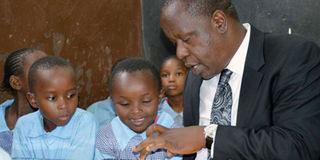Education system should be designed in way that nurtures and builds dreams

Fred Matiang'i, the Cabinet Secretary for Education, Science and Technology, with Class One students at Kiambu Township Primary School on May 4, 2016. PHOTO | ERIC WAINAINA | NATION MEDIA GROUP
What you need to know:
Our education system should give a second chance to students who do not perform well in KCSE.
Instructively, our education system has been criticised as being too exam-oriented and does not impart the prerequisite practical skills for the dynamic world of work.
These criticisms are not farfetched as we have seen students who fail national exams go on to become top entrepreneurs or excel in sports, art and other fields.
Education Cabinet Secretary Fred Matiang’i has received a lot of accolades for the good work he is doing in the sector.
The praises are deserved, looking at his achievements in the short stint he has served at the ministry. He has inspired hope that the myriad challenges that the education sector is grappling with can be addressed with focus, ingenuity, determination and resilience.
The cheating in the national examinations was a problem that was proving to be intractable, defying every solution. However, it is as good as behind us. The wise thing to do now is institutionalise and entrench these gains, so that when there are changes in personnel at the ministry these fundamental achievements will not be reversed.
It is also quite encouraging that the CS’s spotlight has shifted to institutions of higher learning. This move is critical because an education system can only be sound if all its components, right from kindergarten to university, are in good health. We have to ensure that the management at every level is up to speed. We also have to ensure that quality is kept as high as possible and sufficient resources are available.
No country has attained economic prosperity without putting quality education at the centre of its transformative vision. The changes that we are therefore witnessing are key in the realisation of Vision 2030, which is Kenya’s economic blueprint.
Ending cheating in exams goes a long way in stepping up the quality of our education. Why? The abilities of students are gauged appropriately and universities as well as colleges will admit students to courses that are in tandem with their strengths and talents. The end result is graduates who will excel in their respective areas of expertise.
MISPLACED FEARS
There have been concerns that many students who sat the Kenya Certificate of Secondary Education (KCSE) exam last year will not join university because the number of those who attained the minimum entry grade has gone down sharply. These fears are misplaced.
Students who scored below C+, the minimum entry mean grade for university, should not feel that the academic door has been slammed in their face. They still have ample opportunities and pathways to achieve their academic dream. There are a number of colleges and institutions where they can pursue their studies.
We have witnessed people who start at certificate level and scale the academic ladder to the highest level possible through sheer hard work. Some of them are now professors who are highly regarded in their fields for their fundamental contributions.
Some are scholars teaching at the university. Prof Karega Mutahi, for instance, was a P1 teacher; now he is one of Kenya’s reputable scholars.
Perhaps what colleges and other institutions of higher learning ought to do urgently is ensure proper mechanisms for student progression.
It is important that a student who begins at certificate level should have a clear pathway to the highest academic level possible. Institutions should also collaborate, especially in developing joint quality standards, so that students seamlessly transfer grades between colleges or from college to university.
Such a conducive environment will enable a student who scores a D in KCSE to climb the ladder by dint of hard work.
NOT DESTROY
Our education system should be designed in a way that nurtures and builds dreams, not destroy them. It should give a second chance to students who do not perform well in KCSE. Instructively, our education system has been criticised as being too exam-oriented and does not impart the prerequisite practical skills for the dynamic world of work.
These criticisms are not farfetched as we have seen students who fail national exams go on to become top entrepreneurs or excel in sports, art and other fields. It therefore behooves experts to find ways to holistically improve the quality of education and extend its scope so that every talent and ability is taken into account.
For these significant changes to be realised, however, we need all players to act in concert. There are various areas in the education sector that are crying for attention. Before the arrival of the indefatigable Dr Matiang’i, some of these challenges looked intimidating and insurmountable. Now we know that they can be dealt with, thanks to the CS’s inspiration and leadership.
As he focuses on stemming the rot in institutions of higher learning, educationists have to really weigh in and do their bit. We need to discuss how we can make education affordable and inclusive. This way, we will make education the equaliser that it is meant to be.
Simon Gicharu is founder and chairman, Mount Kenya University.





